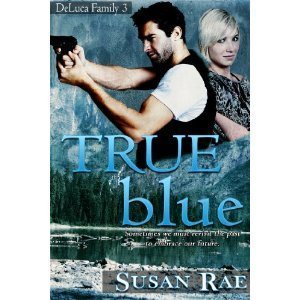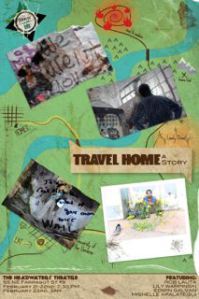Gregory S. Lamb's Blog, page 5
June 24, 2014
Interview with author and poet – Mariah E. Wilson
Interview with Mariah E. Wilson, author of “We Walk Alone – A Collection of Poems”
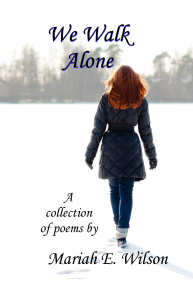 Every now and again, I’ll run across a piece of literature, or in this case a collection of poetry, that is so inspiring that the best way I can think of to share my enthusiasm for it is by getting to know the author. After reading each piece in the collection contained within the pages of We Walk Alone, I was treated to an opportunity to meet with Mariah and learn a few things about an author with a style all her own. For those interested, my review of We Walk Alone is posted here on this blog. We’re so lucky to have Ms. Wilson with us to provide some insights about her creative talents, so let’s get started:
Every now and again, I’ll run across a piece of literature, or in this case a collection of poetry, that is so inspiring that the best way I can think of to share my enthusiasm for it is by getting to know the author. After reading each piece in the collection contained within the pages of We Walk Alone, I was treated to an opportunity to meet with Mariah and learn a few things about an author with a style all her own. For those interested, my review of We Walk Alone is posted here on this blog. We’re so lucky to have Ms. Wilson with us to provide some insights about her creative talents, so let’s get started:
Q: Could you tell us what best describes the genre for the collection in We Walk Alone?
A: It’s hard to assign my poetry with a genre, especially an entire collection. Some of the poems have a bit of romance, others are filled with loss, some are silly, it’s a broad scope of genre’s really.
Q: You’re married with children and yet some of the poems and the title you’ve given the collection suggest experiences of solitude and in some instances loneliness. Where would you see the inner themes of your work and the experiences from your family life collide?
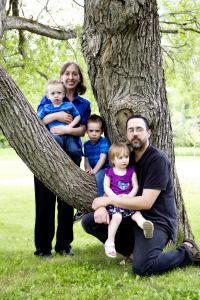
Author and Poet
Mariah E. Wilson -
Pictured with her family
A: You can see my work and family life collide in the poem ‘Broken Toys’, which was inspired by one of my children. Being alone and being lonely are two different things. I think one of the greatest things we can teach our children is how to be alone, but not be lonely. There is much to be said about being able to enjoy the pleasure of one’s own company and not needing to rely on others all the time.
Q: How old were you when you set out on your first adventure in writing poetry? Could you comment a little more about why you write and maybe give us some background on any formal education you’ve engaged in with the creative arts?
A: I was in grade four and my teacher had the class write a poem for a creative writing assignment. My poem was written in rhyming couplets and though I can’t remember the whole thing, it did involve a nun, Al Capone and a bar, so it was pretty epic.
I write because I like to. I publish because it’s fun. There’s really no other reason. Sure, at times my poetry has helped me deal with things and process emotions when I’ve been overwhelmed, but I write even when I don’t need to, so I can’t count that as the reason I keep doing it. I keep doing it because it’s one of my greatest joys.
I actually don’t have any formal education beyond high school. I did graduate with honours and I do a lot of reading whether it be fiction or non fiction, reading helps. I learn a lot by reading.
Q: I read my copy of We Walk Alone on a Kindle. One of the first things I noticed about the various pieces in the collection was the unique visual presentation of how the stanzas appear to the reader. As an example, the poem “We Walk Alone” is presented in the first third of the collection and offers a reading experience, very different than what I’ve seen in other poetry collections. Since a Kindle allows the reader to select various font sizes, would you say that this collection is better suited to a printed version so that the reader can gain the complete experience you had in mind?
A: The only thought I give to font is if it can be easily read. I think the collection could be equally enjoyed in any format. I’d like to think that it’s a good piece of work that is easily able to stand on its own, no matter the format it’s read in.
Q: I found myself re-reading some of the pieces and even trying out how they feel when reading them aloud. Have you done any readings from this collection? If so, can you tell us what sort of reaction you received from the audience?
A: I read all my poetry aloud, alone, in my computer room when everyone else is sleeping. I’m not opposed to the idea of doing a reading, but I have yet to perform one.
Q: For a change of pace – When was the last time you said or did something that caused you to laugh at yourself?
A: I laugh at myself every day. I was taught from a young age “those who can learn to laugh at themselves will never cease to be amused.”
Q: Tell us three random things about yourself that you’d hope would make us laugh:
A: I’m not sure these are funny, but they are random.
I’m a 31 year old woman who still has just about every single stuffed animal she’s ever been given.
When I was in grade 1 I got on stage with my class to perform for the school. We were all supposed to sit down on the benches, but I missed and fell over backward, flashing the whole gymnasium my underwear in the process.
Sometimes I watch movies that I know will make me cry, just so I can cry.
Thank you so much Ms. Wilson, for opening a window for us to discover what it is to be a poet with real talent. We wish you the best and great success with your collection We Walk Alone. I’m looking forward to hearing more about the successful launch of this collection and your future adventures as an author.
Look for more about Ms. Wilson, her writings, and events, at the following locations:
Mariah’s publisher – Writers AMuse Me
Mariah’s Goodreads page
We Walk Alone will be available for purchase on Amazon. Release date is 22 August 2014. In the mean time – enter the author’s book giveaway on Goodreads


Review: “We Walk Alone” – A collection of poems by Mariah E. Wilson
Five Stars – You’ll want to savor each one
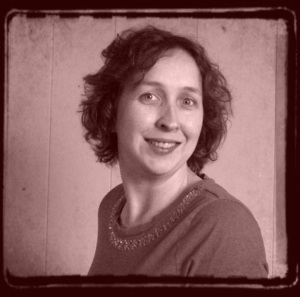
Author and Poet, Mariah E. Wilson
One of the best things about a collection of poems is that the reader can enjoy the sensation of each poem in manageable bite sized pieces. However, this collection provided a different experience for me. I hadn’t intended for Ms. Wilson’s work to captivate me the way that it did. I read every poem, some of them twice and others I read out loud – all in one sitting.
Ms. Wilson’s talents go beyond words. There is a visual and almost musical aspect to the wide variety of pieces she selected for this collection. The title piece, “We Walk Alone” has a visual quality that caused me to read with a rhythm and pace I did not expect. One of the other pieces, “The End of Daydreams”gave me an appreciation for the care the author took in selecting poems that fit together, forming the overall theme of the collection. Of note, there were a few other favorites that I plan on going back to read again. Among them; “The Echo Remains,” a piece that serves as a reminder that memories can be bittersweet, and “The Ugly Ones,” which I thought would resonate with anyone who’s ever engaged in the creative arts.
I do not consider myself a connoisseur of the poetry genre, but I could tell right away that I was reading the work of an author who has studied this art form. Her passion for her work came through in every stanza. When I read “The Sad Ones Are The Best,” I could tell Ms. Wilson must have been having a bit of fun with the technical aspects of her chosen genre.
If you’re a reader who enjoys discovering that written words have the power to evoke deep emotion, you won’t want to miss the chance to read from this collection. Nearly all of the pieces in this remarkable collection are still lingering in my thoughts.


June 13, 2014
Cover Reveal: We Walk Alone – A Collection of Poems by author Mariah E. Wilson
Today we’re celebrating a soon to be released collection of poems by fellow author and poet, Mariah Wilson by showing off the book cover of her poetry collection, We Walk Alone.
poet, Mariah Wilson by showing off the book cover of her poetry collection, We Walk Alone.
Words from the author:
The poems in We Walk Alone examine the journey we take in our head. It’s about the struggle to connect with people and the world around us.
Release date is to be determined. The collection is being published by Writers AMuse Me Publishing.
I’m sure Ms. Wilson would appreciate hearing from future readers of her collection. I’m looking forward to the release. More information about author Mariah Wilson and her work can be found at the following links:


June 12, 2014
Book Review: TRUE blue by Indie Author Susan Rae
Cold Case Comes Alive!
The third installment of Susan Rae’s DeLuca Family Series is a fast paced novel with enough drama to keep me reading late into the night. Ms. Rae is a master of creating tension among the characters that I came to know and like. Joey DeLuca is a detective with a strong sense of dedication to his job and family. His wife Andrea is also on the force. What happens in the first chapters will challenge the love and dedication the couple have for one another.
TRUE blue opens with action and tragedy that coincidentally conjures up a cold case. When fellow detective, Mark Beattie is run down at the scene of a crime, the past comes to life with the recollections of another detective, Sean McConnell, who was murdered twenty-four years earlier. Megan McConnell was just a girl when her father was killed. She and her mother had disappeared to Arizona to get away from the tragedy, but when Megan’s mother dies, she returns to Chicago where family secrets come to the surface. The drama and tension between Joey and Andrea mount as Joey becomes more involved in working with Megan to discover the missing evidence needed to find the killer.
The plot threads in this story are excellent – just enough to keep the reader wondering what the connections are and still full of surprises at every turn, all the way till the end. Though this is a third in the series, Ms. Rae does a masterful job linking it to ICE blue via characters Angela DeLuca and Troy Deavers, who only play minor roles in this novel, which can stand on its own. If you haven’t already, you’ll want to read the other two books in the series.
I can’t wait to read more from Susan Rae – she’s got this genre wired!


May 20, 2014
The Book Trailer of “A Dangerous Element” is here!
In celebration of the upcoming release of digital versions, I’m doing an Ebook Giveaway on Goodreads.


May 1, 2014
Interview with Sanela Ramic Jurich, author of the novels, “Remember Me” and her latest, “Haunting From The Past”
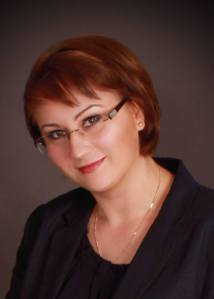
Ms. Sanela Ramic Jurich – Portrait of An American Writer
I’m so thrilled to have the honor of hosting this interview with a writer and master storyteller whom I have the utmost respect for. Ms. Sanela Jurich, now having authored two novels, Remember Me and her latest, Haunting From The Past (My review of her latest is posted here on this blog). Ms. Jurich is one of the more intriguing American writers I’ve met in recent years. I’m anticipating that we’ll all be in for a treat as we are going to meet my friend who is a wonderful and interesting author. Let’s settle in and have her share some of her experiences as a writer and humanitarian – a giver of voice to those who should be heard.
Q: I’ve introduced you as an American writer, but you weren’t born in the United States and English isn’t your mother tongue. Perhaps you tell us a little bit about yourself, where you came from and what brought you to America.
A: First off, I’d like to thank you, Greg, for having me as your guest. You were right to call me an American writer, because that is how I see and introduce myself as well. Both of my books were written in English for I wanted the American public to hear these stories directly from me and to understand my point of view rather than an interpreter’s.
I’ve lived in Chicago for the past twenty-one years and am proud to be an American. However, I was not born here and the first sixteen years of my life played a huge role in forming the person I am today.
Actually, the first fourteen years of my life were pretty much normal. My family and I lived like any other European at the time. My parents worked, I went to school, hung out with friends, etc.
When I turned fifteen, is when my whole life changed. You see, I was born in Bosnia, in a small town called Prijedor. Now days, this town is known by the concentration camps run by the Serbs in 1992 and–more recently–by the biggest mass grave, called Tomasica.
Tomasica Mass Grave was discovered last year and is estimated to hold over 1,000 bodies of slaughtered Bosniaks (Bosnian Muslims) and Croats (Bosnian Catholics) who lived in surrounding villages. Those were innocent people who lived by mostly farming their own land. Tomasica holds bodies of not just men, but women and children too.
Ah, sorry for getting off topic. Every time I mention Tomasica Mass Grave, I get angry, sad, and distracted… let me get back to answering your question – what brought me to America. I hope you have a lot of time on your hands, because I’m warning you, it is a pretty long story, ha-ha!
At the beginning of 1992, both of my parents were fired from work, with no explanation at all. At the time there were others who were not calling themselves Serbs in Prijedor and all of them were fired from work. As you can imagine, little by little we ran out of food and money. We started going over to my grandparents’ house to ask for food. They lived in a small village on the outskirts of Prijedor called Hambarine. My grandparents had a pretty large vegetable garden, some chickens and a cow, which was enough to sustain them without needing to go to the store. I loved going there. Most of my mother’s family was from there, so I had tons of cousins who were also my age to play with.
One day in May of 1992, my mother and I visited my grandmother in Hambarine. On that particular day, we were listening to the radio and the Serbs were talking about how they were going to shell Hambarine the next day. They were saying that they discovered some Muslim-extremists hiding out there and that the shelling was necessary.
My mom and I tried to go back home to Prijedor that day, but were stopped by the Serb army that ordered us to go back. No one could get in or out of town and we were trapped. My father was still at home in Prijedor and we were worried about him.
The next day we hid in my grandmother’s basement, while they shelled us. The noise outside was unbelievable. Thunderous. Unexplainable. But I guess when you’re that young, fifteen, you don’t really get scared. In your mind you see all those war movies you saw throughout your young life, and you know that as a hero in this particular movie, you will survive and everything will be fine…
A few hours into the shelling, we heard someone’s frantic voice coming from the outside, telling us that we had to run towards the woods or we’d all get killed. A column of tanks was approaching. Because Hambarine sits at a higher elevation, we were able to see the convoy of tanks getting closer and closer.
Everywhere I looked, there was nothing but chaos and confusion. People didn’t know what to do, where to go. Children were getting separated from their mothers, senior citizens were being stubborn and didn’t want to go, didn’t want to leave their homes… Somehow I ended up holding my five-year-old cousin’s hand and dragging him along pulling on his arm to try and make him run faster, while running up the hill.
My mother and I got separated and I couldn’t find her. I knew I had to stay with my little cousin and protect him because I couldn’t see his mother anywhere either. He was scared, crying, asking for his mother.
A few of my grandparents’ neighbors were Serbs. Up to this point, everyone in the village lived in harmony. They helped my grandparents harvest their crops the previous summer.
They were now shooting at us.
Still, we managed to climb up the hill and hide deep inside the woods. That was the longest and the coldest night of my entire life.
They didn’t know where exactly we were hiding, so the shells fell all around us. There was so much chaos, confusion, screaming…
I found my mother in a group and a few of us decided to walk toward Ljubija. Most people were scared to leave the safety of the woods, but my mother said, it was only a matter of time until they would come looking for us. She was right…
We ended up walking to Ljubija and finding our way to my mother’s cousin’s house.
A few days later, my mother met one of her old co-workers, a Serb army soldier. He helped us get safely home to Prijedor and to my father.
Back home, there was chaos as well. One of our Serb neighbors decided to stop by to manipulate and harass my father. However, a few of our other neighbors had heard the whole thing, and ran to my father’s aid.
That night, the same guy that stopped by earlier, showed up at our door-step, with a few of his drunk friends and decided to take my father outside at gun-point to kill him. This guy was the inspiration for Radovan’s character in Remember Me.
However, those same good-hearted, guardian angel-neighbors stepped in and saved my father once again.
In the mean time, the Serbs attacked Kozarac; a town of 25,000 people, mostly Muslims. At least 2,500 civilians were killed in Kozarac in a seventy-two-hour period. It was a slaughterhouse. The survivors were sent to the prison camps.
A few days after the Serbs shelled Hambarine where my grandparents lived, the reality of the war (nothing like the movies) hit us hard: You see, after they shelled and destroyed most of the houses, they decided they needed to go in and do the cleansing, better known as Ethnic Cleansing. Once again, news coming from the radio reassured us everything was going to be fine. They were only looking for those few terrorists and if you’re not hiding them, no harm would come to you. All you had to do was put a white sheet on your window letting the army know, you wanted no trouble and that it was okay for them to search your home to look for those extremists. This, of course, was a trick. The white sheets only confirmed you were not a Serb and they could now go in and kill you without a second thought.
The phone call my mother received from her sister that day destroyed every bit of hope we had. My aunt frantically told us that half of our relatives were just killed right in front of their homes. Her own husband was taken away and she wasn’t sure whether he was dead or taken to a concentration camp. My other aunt’s husband, his brother and father were shot to death right in front of them and they (women and children) were now being piled up into busses to be taken away to concentration camps.
One day, my mother and I learned that the foreign media had heard about the concentration camps and wanted to visit. The Serbs had no other choice, but to let them. However, they cleaned and closed down the worst ones, like Omarska and Keraterm and they transferred some men to Trnopolje concentration camp. They tried to say that this was not a camp, but a place where people came willingly, because they lost their homes and had no place else to go. My mother and I decided to walk to Trnopolje one day, to see if we could find any of our family there. A group of other women, who were also searching for their loved ones, joined us on that walk.
While passing by some of the Serb-homes that day, I got hit underneath my right shoulder. When I stopped to see what it was, I was surprised to find an apple lying on the ground by my feet. I looked up, hoping to find an apple tree full of them because, I was starving. We had run out of food a long time before and would only eat whatever our neighbors decided to give us. But to my dismay, I saw no apple trees. What it was, were angry Serb-women throwing apples, rocks, stick and whatever they could grab, at us. One of them was my mother’s co-worker and when she recognized us and realized that we saw her, she threw another apple at us and said: “Here, I thought you might be hungry.” I’ll never forget the look on her face.
I got down to my knees and started picking up those apples. My mom yelled at me to stand up and to be proud, but how can you be proud when you can barely stand upright from hunger? I didn’t care about pride or anything any more. I ate one and I took four to the camp with me to give to my uncles (if I found any there).
We did find my uncle Acha there and my uncle Asim. Acha’s brother in law and some other relatives were there as well. This was the second worst experience of my life, but I don’t want to go into that right now. Let me tell you about how I got out of Prijedor instead.
One day in August of 1992, one of my father’s co-workers, a Serb soldier, stopped by, bringing my father a few cigarettes. He then advised us to leave Prijedor. He even told us about a convoy the Serbs were organizing to take anyone who wanted to leave out of Prijedor to Travnik. At the time the Bosnian and Croatian army held Travnik. The convoy was to leave August 21st, five days before my sixteenth birthday.
We took just a change of clothing with us. My father’s friend told us not to bother bringing anything else, because it would be taken away anyway. I remember specifically, you couldn’t take anything that weighed over 2 kilograms, about 4 pounds.
He, my dad’s friend, was there to show us which truck was the safest one for us. My father had to go and sit at the front of the truck with other men, and my mother and I sat in the back with women. It was so crowded; I half sat on mother’s lap. They covered the truck with some brown tarp and off we went.
A few minutes later, we stopped moving. An armed soldier peaked in waving his gun. He demanded someone to come out and be his helper. He pointed to someone with his gun and said he (inspiration for Johnny’s character in Remember Me) would be this soldier’s buddy for the day. Think about the first crush you ever had. It was probably someone who, in your eyes, was perfect. The most handsome and smartest young man you’d ever known. He was that to me.
The soldier handed him a bag and ordered him to go around and make sure people put all their valuables into the bag. That went on the whole ride. They would stop the convoy every few minutes to steal from us. People ran out of things to give, so they started putting nail clippers and toothbrushes into the bag.
The soldier ordered us to lift up our shirts to make sure we weren’t hiding anything there. And I wanted to die… At that moment I wished I could just die. I would have preferred him to see me dead than with my shirt lifted up. When he got to where I was sitting, he opened up the bag, but–as if he knew how horribly shy and embarrassed I was–he closed his eyes. I had to lift up my shirt. The soldier watched the whole time. I guess humiliating us was more appealing to him than killing us.
The last stop the convoy made (before reaching our destination) was on Koricanske Stijene, on Mount Vlasic. The Serb soldiers pointed their guns at all the men they wanted to take out and kill. He too was among the chosen ones.
The clearest memory I have of him now is the last look he ever gave me. As he was about to step off the truck, he turned around to look at me. The look was not that of fear, or anger, or sadness, worry… It was shame. I honestly don’t understand why he would feel shame. After all, he wasn’t the one holding a gun and killing innocent people. Perhaps he felt ashamed for the same reason I did when I had to lift up my shirt. Perhaps, I’ll never know.
The Serb army slaughtered over 250 innocent men and boys that day…. The rest of us were taken to the other side of the mountain and thrown unto a field of mines. Still we survived. Then we slept on a gym floor of some abandoned school in Travnik for a few days.
The day I was leaving Bosnia forever was August 26th 1992, my sixteenth birthday. I went to Croatia to stay with my aunts. About a year later, August 10th of ’93, I moved to the United States of America as a refugee.
When I first moved here, I spoke zero English. I went to Truman College and registered for some English as a Second Language (ESL) classes. After about a year of that, I started program for credit. I was majoring in Business and Management.
My dream of becoming a writer became just that, a dream; so distant and unreachable. I was a completely changed person then. I figured that even if I, somehow, managed to learn enough English, I could never write happy, fun stories any more. My mind was reset and it was filled with darkness, pain, and distrust.
My parents started working the same month we moved here; mom, as a housekeeper at Sheraton Hotel, and my dad was working all kinds of odd jobs no one else wanted. The only help they accepted from the government was financial aid for my college.
I was confused and needed guidance, but the adults in my life back than were even more confused and scared than I was. They were going through their own pain and scars the war had left on them. But I was fortunate enough to have met some wonderful teachers who did exactly what they were suppose to do—teach and guide.
I found happiness in going to school and meeting new people. I wanted to forget everything I had witnessed in Bosnia, but it was hard. There were more and more refugees moving here every day, bringing with them their own stories of loss and pain.
In college, I was terrified of taking the same classes as the American, English-speaking people. I always took more than one English class. One of my professors was so strict that I hated her at times. She would make me re-do my work over and over until it was perfect. She was the hardest on me out of all of her students and I didn’t think it was fair.
She had followed the war on Bosnia and–she said–when she first met me, she wanted nothing more than for me to succeed. She saw the potential in me. She told me never to listen to what other people think of me. To them, I might be just a Bosnian refugee with an accent. She told me: “Deep inside, you know who you are, so hold on to that.” She said, “I never want to hear the words “I can’t” come out of your mouth again. If others ‘can,’ so can you!”
I’ll never forget her. She gave me back my confidence. She helped me find my way back to me. I realized then how important our educators are. I, also, realized that there are still more good people in the world than the bad ones and no matter how hard your life might seem at times, you just have to hold on until the next day. You never know who you’re going to meet that’s going to change everything.
So, in order to forget about my life in Bosnia and to learn English, the colloquial, street-kind-of-way, I started hanging out with American people. I even married one. But no matter how hard I tried to forget the events of my past, the memories were still there and would come out every night in my dreams. My mom was the only one who knew about those. She was the one running to my room every night and holding me like a toddler until I’d fall a sleep again…. In time, though, those faded a bit.
Q: Having read your Note from the Author, at the back of your latest novel, Haunting From the Past, I thought you did a great job explaining your motivation for writing this story. Could you comment a little more about why you write and maybe give us some background on your choice of characters?
A: I always knew I’d be a writer some day. Even as young as seven years old, I knew writing was what I was going to do when I grew up. I read everything I could get my hands on and I always wrote short stories just for me. If I wasn’t writing them, I was creating them in my mind. However, experiencing war completely changed the person I was as a kid.
My mind became much darker than it was before the war. When I was writing Remember Me, my plan was to write a romance novel. But each time I’d sit at my computer and type, the story would come out completely different than what I hadpreviously planned. Finally, I decided to just go with it. Remember Me was a compilation of various people’s lives, including my own.
At the beginning of each of my books, there is a list of people the book is dedicated to. Those people were very close to me and they were all killed by the Serbs for no reason at all. They were my inspiration. They were with me every step of the way. We knew they were killed by the Serb army on or around July 1, 1992, but we didn’t know where their bodies were thrown. However, a few days ago, I received news that most of them were found and identified in Tomasica Mass Grave and will be given a decent burial this summer.
Q: You are a wife, a mother, a writer, and a motivational speaker. You must be a very busy woman. When and how do you find time to write?
A: I plot my stories during the day. But I usually write at night when the house is quiet.
Q: We’ve corresponded in the past and you indicated that while you are working on a writing project, you are very focused. Now that I’ve read both of your novels, I’m curious about a couple of things other readers might be interested in. Are the characters and their stories mostly created from memories you’ve carried with you since your days in ’92, or did you seek out and interview people who had stories that needed to be told?
A: Remember Me (to include both the plot and the characters) was created from my own memories; places I’ve been to, people I’ve met, relatives, friends… they are all in my novel. They all touched my heart in some way. I didn’t have to do a lot of research or interview anyone for this book, because it was all there, in my head. And once people started reading it, they began calling or messaging, telling me how this book woke up some of their own memories, even memories they were trying to forget. They would just offer the information without me even asking. I can’t even tell you how many people, mostly women, confided in me. At first, I was surprised that they would, but then I realized that they just wanted to share with me, like I had shared with them.
One woman started telling me how much she loved my book and then she just broke down and cried, telling me–in detail–what was done to her in a concentration camp that was run by the Serb Army in 1992. Later she explained that she never really talked about it like that before. When she got out of the country and moved to America, she was offered help, but because she couldn’t speak English, she couldn’t talk to her therapist. They provided her with a translator, but she couldn’t do it that way. And so, she never opened up and she never truly talked about it, until she met me. I broke down and cried with her.
Two years ago, while visiting my family in Bosnia, one of my father’s old friends, a Serb soldier, had stopped by. Little by little, over coffee, he told us about his own memories of war. I was shocked at his honesty. I was literally sick the whole month I was there. But, even though his confessions shook me to the core, they did give me some ideas for Haunting from the Past. This guy inspired one of the main characters in this, my second novel. In the story, he was captured and is in prison, but in reality, he (like many others, like the guy who inspired Radovan’s character in Remember Me) is free and is considered a hero by his people.
Q: Both of your novels resulted in an emotional experience for me as a reader. I can only imagine that writing them must have taken a lot out of you. Can you comment on your journey as a writer bringing to light the themes for your novels?
A: Honestly, I was a bigger mess before I started writing my books. Those memories and thoughts would just come out of the blue and destroy me. Like the woman I mentioned earlier, I also never got to talk about it when I first moved here and so, I held everything in. I tried talking to some of my old friends (when I was much younger), but none of them seemed to believe me, so I stopped talking about it. I always felt guilty, though, for not talking about it, for not telling the world about all those people who died for no other reason other than the fact that they were not Serbs and so when I was writing Remember Me, everything I was holding in, came out.
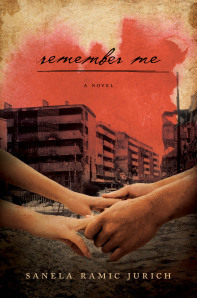
Jurich’s debut novel – Remember Me
I wrote Remember Me as a fiction novel because I didn’t want to mention anyone’s real name, but all of the feelings I was holding in, came out and for me it was therapeutic. Now, I don’t think of those memories as much as I did before and even when I do, they don’t hurt as much. I can honestly say, I’ve moved on. I wrote Remember Me for myself, as my own therapy. Now that it’s all out, I know it’s never going to be forgotten because books are forever and that’s why I am able to put it all behind me and truly live in the present.
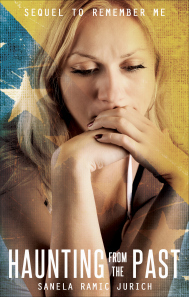 Haunting from the Past was written for those who don’t have a voice any more and can’t tell us their stories.
Haunting from the Past was written for those who don’t have a voice any more and can’t tell us their stories.
Q: As a wife and mother of two sons, what roles do they play in providing the support a writer needs?
A: They are wonderful cheerleaders. When they know I have a deadline, they leave me alone. They help my husband run errands and cook… and by cook, I mean order take-out, ha-ha!
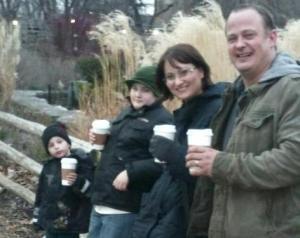
Ms. Sanela Jurich pictured with her husband Todd and sons Denny and Devin
They didn’t read my books and don’t know what the books are about and so they keep telling me to write something they could actually read, like a children’s book about pirates, ha-ha. They are very specific, pirates, no princesses.
Q: I know that Haunting From the Past was just released. Are you working on another project right now?
A: Other than doing most of my own marketing, I’ve been trying to finish a children’s book I started writing about two years ago (it’s not about pirates, ha-ha! Please don’t tell my children.)
Also, a few weeks ago, I was contacted by one of the Women’s Magazines asking me to write for them for a year. They are very interested in my work and would love it if I could write articles for them. I’m still thinking about that one though. There are just not enough hours in a day for everything I have to do, but honestly, I wouldn’t want it any other way.
Q: Time to lighten things up a bit – what is your favorite color and why? Do you have a favorite food?
A: I don’t really have a favorite color. I might be leaning a little towards blue, but I don’t really know. I love them all.
Favorite food, again, I don’t have a preference. I love it all, ha-ha! When I was a kid, I used to love Nutella. I ate it every single day. But after seeing what it’s like not to have any food, I’m not very picky.
I never told anyone this before, well, maybe one person, but when I was in Travnik those few days, sleeping on a floor of some abandoned school, I ate rice with some ground beef that had gone bad. Half way through my plate, I noticed warms; actual warms in my food and you know what I did? Nothing. I kept on eating, because I had no idea when I’d be getting my next meal.
You know, now that I think about this, I have to tell you about something nice that happened to me while in Travnik. A bunch of young people who lived there came to this school where we were staying to see if they could offer any help. My cousin and I became friends with a few of them. One of them–his name was Almir–had a huge dent on his forehead (I mentioned that in Remember Me, but I changed his name to Adnan). Almir was hit by a piece of shrapnel from a grenade that destroyed his house and killed his family. Anyway, my cousin had mentioned to them that the next day was going to be my sixteenth birthday and that I was leaving.
The next day, we stood outside, waiting for a bus to come and take me away forever, when the guy with a dent, Almir, came running. He had a birthday gift for me. It was wrapped up in newspaper. It was a bar of chocolate. They all pitched in and got it for me. I cried so much. They had nothing else to give and I hadn’t seen chocolate in almost a year… I never even ate that bar of chocolate. I kept it as a reminder that, in spite of everything, there are still some good people in this world who would go out of their way to help and make you happy.
I kept that bar of chocolate for eleven months and then I had to move to America. I wasn’t allowed to bring any food into the country. It was hard to throw it away, but I had to, for it was time for me to say good-bye to my life there and see what the next chapter of my life was going to be here.
Q: Tell us three random things about yourself that you’d hope would make us laugh:
A: One thing that my children find hilarious is that even when I sing I have an accent, ha-ha!
One other thing… this one is perhaps weird and not too funny. When I’m alone with my thoughts, I think as if I’m reading a book. For example, I’d go to the Six Flags with my husband and our friends, but because I’m afraid of heights, I wouldn’t go on any of the rides, so I’d sit on the bench and wait for them to get off their rides.
The situation is perfect because the place is always crowded, which gives me a chance to just watch people undetected and make up stories about them in my head.
I remember one time I spotted this young couple talking and teasing. It was obvious they liked each other. I couldn’t really hear what they were talking about until she turned away from him and said: “I don’t care!” But while turning away from him, I noticed that she was smiling. So my inner monologue went something like this:
“I don’t care,” she said firmly. Turning around, she smiled, ever so slightly.
My husband says he cracks up every time I get angry, because I start speaking English, then I switch to Bosnian, then English again and by the time I’m done, he’s completely lost and has no idea what I was trying to say, ha-ha! (He doesn’t speak Bosnian, by the way).
Thank you so much Ms. Jurich, for being your honest self and candidly sharing insights that readers and other writers will appreciate. I knew I’d be coming away from this interview with even more respect and admiration for all that you’ve shared with us here today. I’ll confess that once I read something really good, I’m eager to learn about the author and the stories behind their novel.
I really hope you accept the invite to write for the women’s magazine you mentioned. You know I’ll be one of your biggest fans (though I rarely read women’s mags, I’d make an exception in this case). Additionally, you certainly provided us with a window into your world as a caring person and talented American author. I’m looking forward to hearing more about the successful launch of Haunting From The Past, and your future adventures in this world full of stories, ready to be written. Finally for Sanela’s fans – please don’t tell the Jurich boys that her up coming YA novel isn’t about pirates.
Ms Jurich: “Thank you, again, for having me as your guest.”
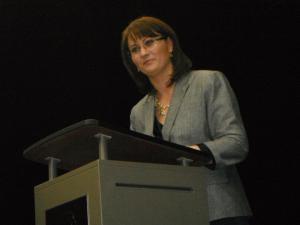
Ms. Sanela Ramic Jurich – Motivational Speaker
Look for more about Ms. Jurich, her writings, and speaking engagements, at the following locations:
http://sanelajurich.tateauthor.com
Both Remember Me, and Haunting From the Past can be purchased on Amazon. Signed copies are available from the author’s website. On the topic of the author’s website, Sanela Ramic Jurich is also a reputable motivational speaker. There is a short TV Newscast posted on her website where you can see and hear the voice of the author describing events that launched these novels.


April 30, 2014
Book Review: “Haunting From the Past” by Sanela Ramic Jurich
Five Stars
A Voice for the Voiceless – Deep and Honest
 Readers will enjoy this authentic story of triumph over tragedy. Written as a sequel to Ms. Jurich’s debut novel, Remember Me, I’ll venture to say this one is even better. Told from the point of view of a master storyteller, the novel’s Prologue launches the reader into investigating some deep and meaningful questions that may or may not be answered. I found myself immediately captivated in anticipation of an emotional roller coaster ride of a journey later to discover pure satisfaction when the ride was over.
Readers will enjoy this authentic story of triumph over tragedy. Written as a sequel to Ms. Jurich’s debut novel, Remember Me, I’ll venture to say this one is even better. Told from the point of view of a master storyteller, the novel’s Prologue launches the reader into investigating some deep and meaningful questions that may or may not be answered. I found myself immediately captivated in anticipation of an emotional roller coaster ride of a journey later to discover pure satisfaction when the ride was over.
The author’s prose will tug at your heartstrings as the story opens with the main character; Selma Mazur accepting an invitation to return to the places where the demons of the traumatic past still haunt her in the quiet of her dreams. Told in the first person from Selma’s point of view, the reader is presented with the dilemmas and emotions Selma must face as the story unfolds. Ms. Jurich’s central theme centers on giving voice to the unheard, specifically the casualties of the human conflict. This story is written from the perspective of the knowing, and warrants a broad audience, the underlying hope that the painful lessons of the past will not be forgotten.
The story is rich with place descriptions, and realistic dialogue that made me feel like I was in the story, beside Selma as she came face to face with an imprisoned war criminal to listen to his confessions. Eventually Selma travels to Prijedor, her native town in the north of Bosnia-Herzegovina. While there she recognizes her need for closure and tells herself, it is “…time for me to start coming to grips with my past.”
I thoroughly enjoyed the subtle ways that Ms. Jurich’s theme came through in the dialogue. When Selma’s mother, Sabina tells Selma she’d been giving money to Damir, a Serb boy now in jail struggling with his drug addiction while fighting demons of his own, Selma wonders how her mother could be so willing to forgive. Sabina’s response, “I like to think that there are more good people in this world than bad ones, and no matter what he did to others, we cannot forget that he was good to us.”
Now that I’ve read this story, one particular “haunting” idea continues to run around in my mind. When Selma contemplates the war criminal, Mr. Pavlovic, whom she meets with at the beginning of the story, she reflects on the notion that had there not been a war, and had this man Pavlovic not been thrust into the position he found himself in, the side of him that became monstrous in war may never have come to light. He would have possibly remained a respectable businessman, married with a child, living a peaceful life with no idea of ever harming another human being.
Though this novel is a sequel, it can stand on it’s own with sufficient back story to cover some of the key plot elements from Remember Me. However, I’d venture to guess that anyone who enjoys reading Haunting From The Past, would definitely want to read them both. For readers remotely reluctant to dive into stories with dark and tragic plot elements, I can assure that the satisfying conclusion of this story is most certainly one of “Triumph over Tragedy.”
Look for Haunting From The Past on Amazon to pre-order a copy. It will be officially released on 6 May 2014.
Signed copies of both novels are available directly from the author’s website.


March 9, 2014
Retired United States Airforce Colonel To Publish New Military Thriller Book | PRLog
Retired United States Airforce Colonel To Publish New Military Thriller Book | PRLog.
I’m pretty stoked about next week!


February 25, 2014
Performing Arts – Fringe Theater
I had been a nomad for most of my adult life. Having dragged my wife and family around from town to town, we finally found a place to call home in Portland, Oregon. I wrote the following article and review of a stage performance that resonated with me, as I know it will with others, no matter where or how they live:
Presented by “The Honest Liars”
When put together in a stage performance, words and the ideas they represent can be a powerful vehicle for drawing attention to social issues that touch the lives of nearly everyone. Travel Home, A Story is just that kind of performance, delivered by the local Portland community theater troupe, “The Honest Liars.” One could get lost in this play and I almost did.
Directed by Rafael Miguel, the Travel Home, A Story performance was the result of a series of workshops that focused on the central theme of answering the question: What is Home?
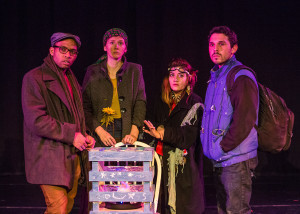
From the left, Rob Lauta, Lily Warpinski, Mishelle Apalategui, and Edwin Galvan
Four actors played the parts of, a gypsy named Myrna, a runaway; a wannabe beat poet named Jack, and a delusional woman playing out life as a pirate philosopher. In juxtaposition to these characters living on the streets, the same for actors played the rolls of young adults struggling with different kinds of challenges. Together all of them were seeking their personal definition of what home is or should be. Each actor brought to the performance their own special qualities that made the characters feel authentic in every respect. I’m still in awe of the talent and flexibility each of these young actors demonstrated while shifting from one character roll to the next.
When I met with writer and actress Lily Warpinski at the Headwaters Theatre in North Portland, I asked what she hoped the audience would come away with after experiencing the show. She said, “I feel like I’ve done my job if the people who see our shows get sucked into the world of the play in a really visceral way and come out of the performance feeling not only that they’ve witnessed something interesting, but also feel physically and emotionally invested in whatever aspect of the piece appealed to them the most. Hopefully that the investment spurs them to get more grounded in their world and do something that impacts the community.”
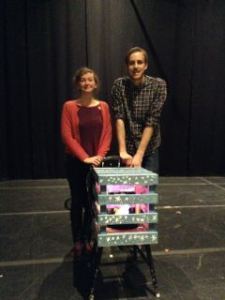
Lily Warpinski pictured with Set Designer, Garret Conour on the stage at the Headwaters Theater
The actors and small production team who comprise the touring theater company are all young passionate thinkers of the millennial generation. At twenty-five years old, Ms. Warpinski has been acting professionally for just under five years. Along with the other members of the cast, Mishelle Apalategui, Edwin Galvan, and Rob Lauta, equally youthful and equally talented, Warpinski and the production crew brought the central theme of this show to the forefront. It is with a keen sense of observation and desire to understand the community where they live and work that made this performance come alive with authenticity and grit.
The Honest Liar Collaboration also included local photographer John Koch. Ms. Warpinski said that John’s access to the local community of people living outside on the streets of Portland was instrumental in the development of the script and the character rolls.
Though I didn’t get the chance to meet Mr. Koch personally, I gained a sense of his contribution when I saw his photo exhibit on display in the Headwaters main lobby. One of Koch’s pieces, titled “David” grabbed my attention. The caption reads:
[image error]
“David” Photographed by John Koch
“David told me that some people – most frequently young adults – can be rude to people asking for donations on the street. He showed me a torn dollar bill that someone passed off to him as a joke, presenting it to him as if it were a wadded up, spendable bill. In term s of monetary value, it is worthless. Since he offered it to me and I accepted it, it has taken on a different kind of value to me.” – John Koch
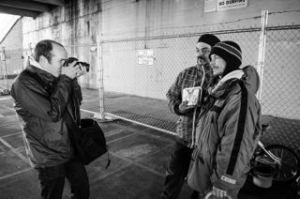
John Koch – Doing his work on the streets of Portland
Readers can learn more about The Honest Liars from their website:
Read more about Travel Home, A Story here:
http://theheadwaters.net/?service=the-honest-liars-present-travel-home-february-21-23
Read more about photographer John Koch on the following sites where you can view more of his work:
http://www.honestliars.org/#!john-koch/cze4
http://nathansanbornphoto.com/blog/2014/1/28/the-intensity-of-my-fear-and
http://www.flickr.com/photos/orphotographer


February 24, 2014
A Poem from “My Safe Friend”
I consider myself a lucky man, not only because my wonderful wife has filled my life with joy and happiness, and not just because of the three sons we raised together; three independent young men who we are ever so proud of. I know of other families who can boast of the same good fortune. I’m lucky because I have friends.
My old and dear friend Mike Colaco is a humble man of many talents. Of late he’s taught me a thing or two. One of those things has to do with friendship and what it means to have a safe friend.
Last weekend I had my 54th Birthday and a visit from my safe friend, Mike. I’m not sure if his intent was to give me a copy of this poem he wrote, as a gift in celebration of my birthday. In his casual way, he handed it to me just before leaving for the evening. Mike is confident and quiet and knows me well enough that I’d need to be alone when reading this poem for the first time. Thanks Mike for the gift – the meaningful gift.
The Sculpture
By Mike Colaco
I am a block of marble of a vague form, indiscernible, heavy, in need of work. I have a sense of another form or shape. I am in the sculptor’s workshop. I am to be perfected. The excess is to be chipped away. The chisel is sharp, the hammer heavy. The blows bring pain and tears. I try to stay together but the pieces fall. I know them. They are me, yet they fall away. It hurts to let them go. I used to know my shape. I feel vulnerable, helpless, confused, naked. What is this shape I am becoming?
I feel light and fragile. I feel weak. I need to be strengthened. Do I need support with wood or steel? No. My strength was formed in creation. My grains were bonded in heat. My inner structure was sealed from the beginning. I’ve always had my strength. The sculptor knows this. He is careful with his strokes. He cuts in the proper direction. With a steady hand. With a precise measure and a keen eye. I can trust the sculptor. I can trust my strength.
One day I will be completed. Confirmed a finished work. A beautiful creation. He will be pleased with me. I will feel the shape. I will know the meaning of my form. I will understand my purpose. I will be an example of His work. I may be a wonder to some who will sit and stare. Others may show me no interest. But I will know what I am.
Then the sculptor will take me away and establish me in my place. He will place me on firm ground. Wind will blow hard on me. Rain will batter me. The hot sun will bake me. But I will stand firm. People will come and study me and walk away with new hope. I will attract artists who will draw and paint me. My shape will be known by those who have never seen me. And I will love my sculptor for what he has done.
I meant to ask Mike if he has more like this one – maybe even a collection. Between his work, his art, his music and talents as a budding spiritual counselor, I hope Mike will find the time to publish some of his writings.



